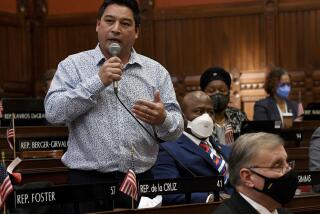Give Congress More Pay and Less Reason to Pander
- Share via
When the 101st Congress convenes in early January it will immediately face a long-ignored ethics issue that impinges on the integrity and quality of our government and the way citizens are served: Where (and how) do our senators and representatives get their income?
Today senators get up to 40%, and representatives up to 30%, of their income beyond their salaries from special-interest groups that pay them honorariums--fees--of up to $2,000 for giving a speech, visiting a manufacturing plant or just showing up for breakfast. These “hands that feed” are the same “hands that seek” legislative favors, creating an intolerable conflict of interest. This also has created a form of institutionalized corruption in which the honorarium is a legal instrument for buying influence over government decisions.
Even when it comes to their government salaries, Congress members are involved in another conflict of interest: They vote on the size of their own paychecks, as well as those of other top government officials.
Both conflicts need to be abolished early in the next Congress.
The honorarium has become a vehicle for special interests to stick money directly into the pockets of lawmakers. From 1986 to 1987 there was a 30% jump in honorariums reported by both houses; members received almost $10 million in 1987 alone.
In contrast, officials in the executive branch have long been banned from taking honorariums that conflict with their government responsibilities. As one former assistant attorney general, William Weld, has said, if members of the executive branch were to supplement their salaries with fees for job-related activities the way members of Congress do, they “would be immediately clapped in irons.”
What it comes down to is that no public official should serve two masters. Members of Congress cannot credibly hold defense contractors accountable, for example, when they are receiving hundreds of thousands of dollars in fees from these same contractors. Public officials ought to be paid for doing the public’s business by the public, not by any private interests. In turn, the nation must have a fair and orderly process for establishing appropriate compensation levels for members of Congress and other government officials. The salaries of top officials are not, and should not be, competitive with comparable leadership positions in the private sector; there are extraordinary rewards in having the privilege to help lead the nation. On the other hand, the average family income is not the appropriate yardstick, either, for determining compensation levels for our nation’s leaders.
The salaries of Cabinet secretaries, members of Congress, federal judges and other top officials should reflect their vital roles in our society. Today they do not.
Historically, attempts by members of Congress to adjust their own salaries have been politically charged, and Congress has been reluctant to carry out the task. The first increase in congressional pay did not occur until 78 years after the creation of Congress. The salaries of all top government officials have been held captive by this process, since Congress will not establish salary levels for Cabinet secretaries and federal judges that are higher than what members of Congress get--at present, $89,500. Twenty years ago the salary was $42,500. If simply adjusted for inflation, it would be $137,000 today. In effect, there has been a 35% decline in the purchasing power of congressional salaries over the last 20 years.
Under existing law a special national commission periodically reviews the salaries of top officials in all three branches of government and makes recommendations to the President, whose decision is reflected in his proposed budget. Congress then has 30 days to reject the salary proposals; otherwise they take effect.
Congress should amend this process by repealing the 30-day override provision, leaving the salary-level decisions for members of Congress and other top government officials entirely to the national commission and the President.
This week the national commission recommended raises in the 50% range for members of the Cabinet ($149,250) and Congress ($135,000), among others.
Since the Constitution requires that congressional salaries be “ascertained by law,” questions have been raised about the constitutionality of taking this decision out of the hands of the lawmakers. In fact, a U.S. Circuit Court held last year that the Constitution does not require Congress to determine specific salaries, but only to ensure that they are provided by law--a requirement that would be met by the process proposed here.
The new Congress must move quickly to deal with its dual conflicts--and, as a consequence, to strengthen its integrity. The nation would be better served if its primary legislators were off the private payroll of special interests and out of the business of determining their own salaries.
More to Read
Get the L.A. Times Politics newsletter
Deeply reported insights into legislation, politics and policy from Sacramento, Washington and beyond. In your inbox twice per week.
You may occasionally receive promotional content from the Los Angeles Times.










